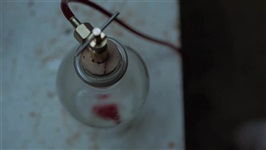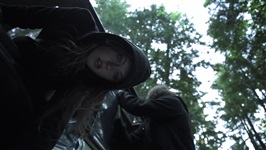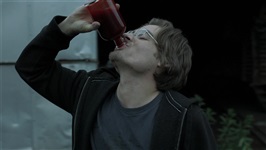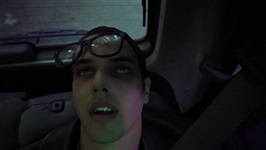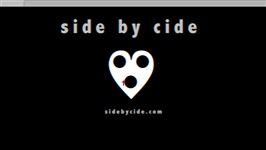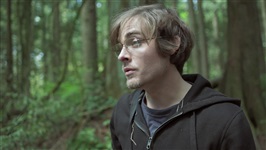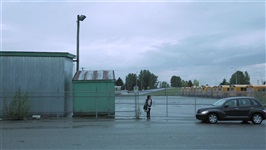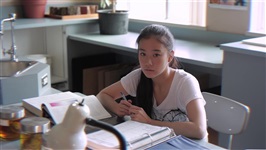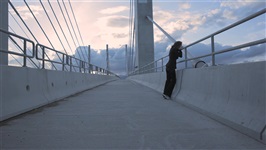Vampire (2012)
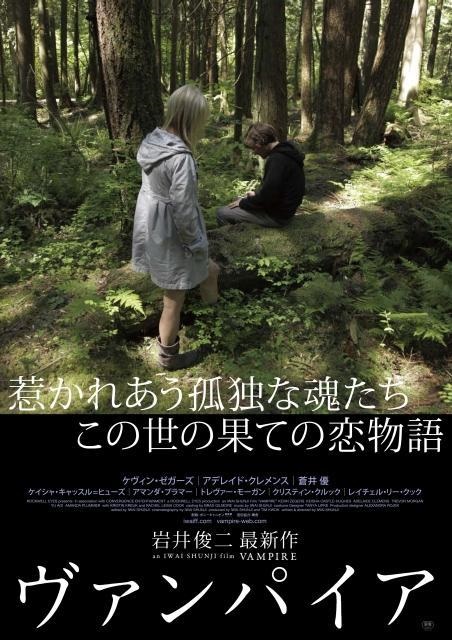
A young biology teacher named Simon meets a woman called Jellyfish via a website where people can enter into mutual suicide pacts. When they meet up in the flesh to go through with the pact Simon suggests - seemingly off the top of his head - that blood loss is supposed to be a peaceful, painless way to go... and he just happens to have the necessary equipment with him.
The fact that there is only equipment for one person is one of many signs that he doesn't anticipate being dead himself any time soon, but the girl agrees to let him stick needles in her veins and drain her blood into several glass jars anyway. After the jars are full, Simon greedily takes a long drink from one of them ... and then promptly throws it all up.
Another website leads him to meet up with a group of people obsessed with vampire mythology and imagery and who idolise the vampire lifestyle. They're all very excited about a serial killer people are calling The Vampire, because he kills by draining the blood from his victims.
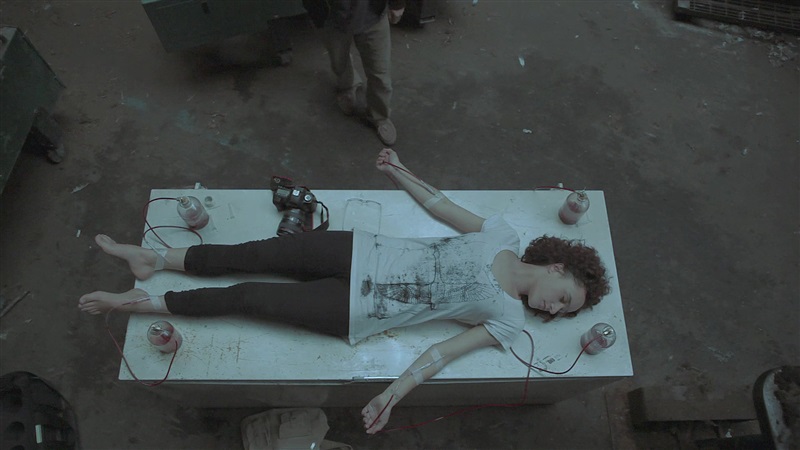
VAMPIRE is to date the only English language film by Shunji Iwai, filmed in Vancouver (standing in for Seattle I believe) with a Canadian cast & crew - apart from a small part for Yu Aoi, who somehow still looks more like a high school student than anybody else in the room seven years after Hana and Alice.
It has not been particularly well received, with low scores on Amazon and IMDB, and given the history of underwhelming films made by Asian directors in the English language I could happily have passed it over, but the Bluray was so cheap in Germany it seemed rude not to pick it up.
I suspect that the negative reactions are largely due to distributors trying to pitch the film as something that it is not. It is not a horror movie, whatever the German cover wants to suggest. It is not a film about immortal blood sucking fiends, which is what cover for the US release implies by blatantly aping the gothic art for BRAM STOKER'S DRACULA.
It seems short-sighted for a company to advertise a product as something it is not to hoodwink a few buyers into watching a film that will inevitably disappoint them, and thus lead to bad reviews.
VAMPIRE is actually a film about lonely people who feel so little connection to the world that they want to die ... or at least don't see much reason not to.
It's filmed in that loose, naturalistic style that has become Shunji Iwai's signature, coupled to a melancholic soundtrack that Iwai composed himself. Scenes often feel unstructured and improvisational, with the camera roving about in a pseudo-documentary manner, whilst in other places it is more composed and deliberate - particularly the drawn out scenes of bloodletting.
Typically for Iwai, the film is more about moments and moods than any sort of narrative urgency, and is quite episodic.
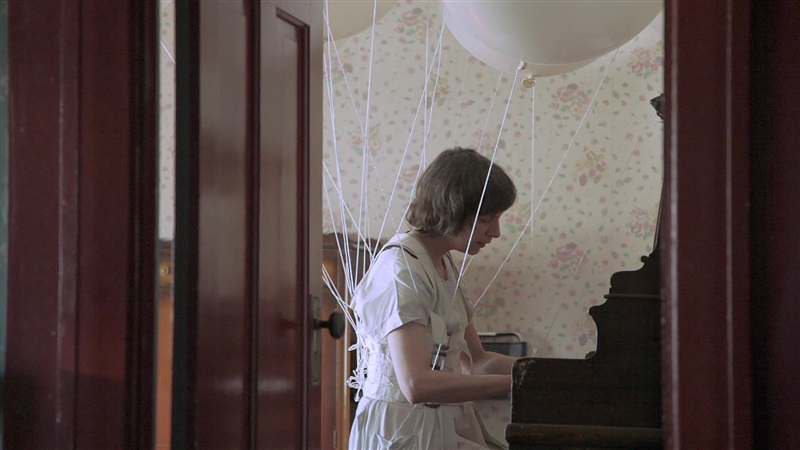
Whilst Simon is technically a serial killer, his victims all consent to their deaths so it could be argued that he is just helping them achieve their goals - even if he isn't sticking exactly to the fine print of their arrangement. He isn't exactly a sympathetic character but he isn't portrayed as a monster either.
The film isn't judgemental about its various suicidal characters - everybody is presented more like a victim, perhaps just of a society that has let them fall by the wayside, and that's largely true of its central character as well. People mostly just seem desperate to form a connection with somebody, to have an experience that means something. Drinking their blood perhaps satiates Simon's need for intimacy that he is too afraid to seek in a relationship that would make him vulnerable.
A pivotal scene happens when Simon finds his exchange student preparing to hang herself and asks her "You who decides to kill yourself, do you really know who you are? Do you know that self?". Modern life and its endless distractions perhaps alienate us from our own genuine feelings.
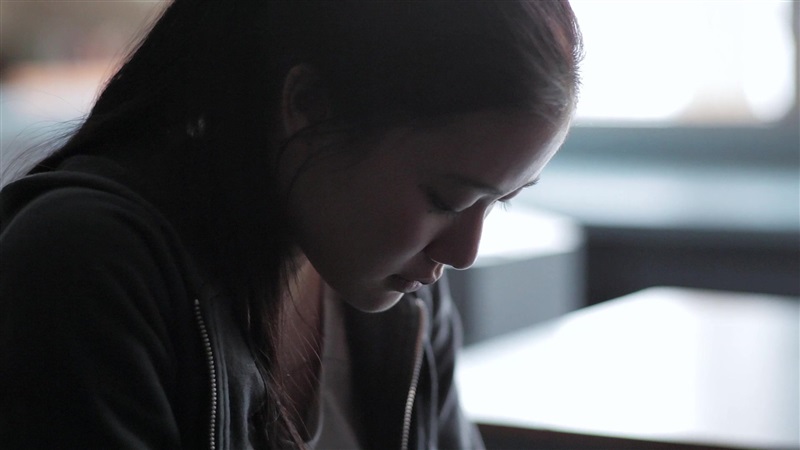
It must be noted that the bad reviews for the film aren't all from people who were expecting it to be a horror film about unholy terrors... in fact some of the lowest scores on IMDB are from Shunji Iwai fans. I think it's fair to say that it's not a completely successful film, and definitely not one of his best.
Perhaps the language barrier prevented Shunji Iwai from developing the kind of connection with his cast that normally allows him to elicit such powerful performances from them (although I seem to remember his English is pretty good).
I think possibly it's a mismatch between form and content though - the subject matter isn't necessarily well served by Iwai's way of filming it. The naturalistic style sometimes makes people expressing some very dark, dramatic thoughts and feelings seem a bit awkward and contrived.
This dissonance also makes the film interesting though, allowing its themes and ideas to inhabit the foreground where a more dramatic, conventionally cinematic delivery might have obscured them.
It's not a film I'd recommend to everybody, it's perhaps an experiment that wasn't entirely successful, but is interesting in its flaws.
Cast
Crew
| Director | |
|---|---|
| Writer | |
| Soundtrack | |
| Cinematographer |
